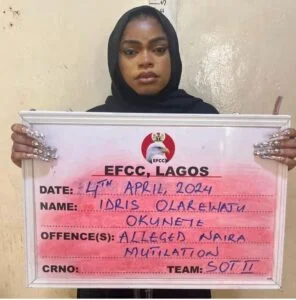Judiciary
Supreme Court Rules Old Naira Notes to Co-Exist with New Ones Indefinitely

Supreme Court Rules Old Naira Notes to Co-Exist with New Ones Indefinitely
In a landmark decision on Wednesday, the Supreme Court of Nigeria declared that the old Naira denominations of N200, N500, and N1,000 notes will continue to co-exist with the recently introduced notes until further notice.
This ruling ensures that both the old and new currency notes will remain as legal tender beyond the previously set deadline of December 31.
The court emphasized that the Federal Government must establish a transparent process for the replacement or redesign of the old notes after conducting thorough consultations with relevant stakeholders.
The apex court’s decision follows its earlier order on March 3, which restrained the Central Bank of Nigeria (CBN) from implementing the initially stipulated deadline for the use of the old notes.
Despite the court’s intervention, the CBN had, on November 14, extended the validity of the old N200, N500, and N1,000 notes indefinitely. The move by the apex bank aimed to provide flexibility and ensure a smooth transition for the public.
The decision to introduce redesigned N200, N500, and N1,000 denominations was initially implemented by the CBN in October 2022, accompanied by specific deadlines for the phasing out of the old design from circulation.
This recent development offers a reprieve for individuals and businesses alike, allowing them to continue using the older Naira notes without fear of their legal tender status expiring.
The Supreme Court’s decision underscores the importance of a well-thought-out and consultative approach by the government in managing currency transitions to avoid disruptions in the financial system.
As the nation awaits further directives from the Federal Government on the replacement or redesign process, the co-existence of old and new Naira notes serves as a temporary but necessary measure. The decision by the Supreme Court ensures that the financial landscape remains stable, providing assurance to citizens and businesses during this transitional period.
This ruling by the Supreme Court marks a significant development in the ongoing discussions surrounding the nation’s currency, offering a balance between the introduction of modernized notes and the need for a seamless transition for the Nigerian populace.
Judiciary
Court discharges man accused of burning father’s house in Abuja

A Chief Magistrates’ Court in Bassa, Abuja, on Friday discharged a 28-year-old man, Hamza Azizz, who was accused of setting his father’s house on fire in Bassa Village.
The Chief Magistrate, Abdulrazaq Eneye, released the defendant after he had spent three weeks at the Kuje Correctional Center.
Eneye also ordered Azizz to undergo counselling and warned him against committing similar offences in the future.
“The court can now discharge you into society after assessing your mental state through the correctional center,” the magistrate ruled.
Azizz expressed remorse for his actions, pleaded for leniency, and vowed to stay away from drugs.
The prosecution counsel, Mr A. Aliyu, told the court that the defendant had poured kerosene on his father’s body before also dousing the house with kerosene and setting it ablaze.
The father later reported the incident to the police in Bassa Village.
Azizz was charged with mischief and criminal intimidation, offences that contravene Sections 327 and 397 of the Penal Code.
Judiciary
Nnamdi Kanu apologises over attacks on judge, others

Nnamdi Kanu, the leader of the proscribed Indigenous People of Biafra (IPOB), on Friday, tendered an apology over his recent attacks on the Federal High Court and Justice Binta Nyako.
Kanu, through his new counsel and former Attorney-General of the Federation (AGF) and Minister of Justice, Chief Kanu Agabi, SAN, also apologised to the Federal Government’s lawyer, Chief Awomolo, SAN.
The IPOB leader equally apologised to his team of lawyers earlier led by Aloy Ejimakor for also attacking them while before Justice Nyako.
Kanu tendered the apology through his lead counsel, Chief Agabi, before Justice James Omotosho, the new trial judge.
Upon resumed trial, Agabi sought the court’s permission to deliver a message on Kanu’s behalf.
He said he had already discussed the development with the lawyer to the prosecution and Justice Omotosho granted the application.
The News Agency of Nigeria (NAN) reports that Justice Omotosho had fixed March 21 for the trial of Kanu.
The judge fixed the date after the case file was transferred to him.
Kanu, who was brought back to the country in June 2021 from Kenya, was expected to take his plea as the case begins afresh (de novo).
NAN reports that the Chief Judge (CJ) of FHC, Justice John Tsoho, had, in a letter dated March 4 and addressed to Kanu’s lead counsel, Mr Aloy Ejimakor, communicated the re-assignment of the case from Justice Binta Nyako to Justice Omotosho.
The re-assignment followed the demand by Kanu and his team of lawyers for the transfer of the seven-count terrorism charge to another judge, after alleging bias.
Justice Nyako, on Sept. 24, 2024, withdrew from the case and sent the case file to the CJ of FHC for re-assignment.
The judge said she could not proceed with a trial where a defendant lacked confidence in the court.
However, the CJ sent Kanu’s case file back to Justice Nyako for adjudication, insisting that a formal application must be made by the defence before the recusal could be accepted.
But Kanu and Ejimakor, on Feb. 10, insisted that Justice Nyako no longer had jurisdiction to preside over the case after her recusal (withdrawal) from the matter, prompting the judge to adjourned the case indefinitely (sine die).
NAN reports that Justice Ahmed Mohammed (who has been elevated to Appeal Court) and Justice Tsoho (before becoming the CJ) had presided over Kanu’s trial before it was assigned to Justice Nyako, following the defendant’s rejection of the two judges.
Headlines
Supreme Court nullifies Rivers LG elections

The Supreme Court on Friday, nullified the Local Government election in Rivers State, which was conducted on Oct. 5, 2024.
A five-member panel of the apex court unanimously held that the election was conducted in violation of relevant laws.
Justice Jamilu Tukur, in the lead judgment, agreed with the appellant, the All Progressives Congress (APC), that conditions precedent were not complied with before the Rivers State Independent Electoral Commission (RSIEC) held the election.
Justice Tukur held that there was no evidence that the voters’ registration continued until 90 days before the election and that the requisite notices were issued as required by law.
-

 Headlines4 years ago
Headlines4 years agoFacebook, Instagram Temporarily Allow Posts on Ukraine War Calling for Violence Against Invading Russians or Putin’s Death
-

 Headlines4 years ago
Headlines4 years agoNigeria, Other West African Countries Facing Worst Food Crisis in 10 Years, Aid Groups Say
-

 Foreign4 years ago
Foreign4 years agoNew York Consulate installs machines for 10-year passport
-

 News1 year ago
News1 year agoZero Trust Architecture in a Remote World: Securing the New Normal
-

 Entertainment3 years ago
Entertainment3 years agoPhyna emerges winner of Big Brother Naija Season 7
-

 Headlines2 years ago
Headlines2 years agoNigeria Customs modernisation project to check extortion of traders
-

 Entertainment2 years ago
Entertainment2 years agoMovie download platform, Netnaija, announces closure
-

 Economy2 years ago
Economy2 years agoWe generated N30.2 bn revenue in three months – Kano NCS Comptroller











